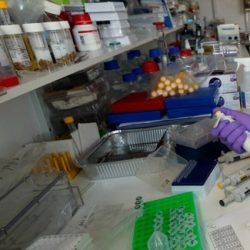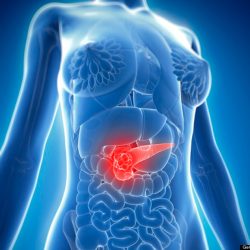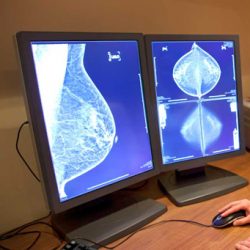Yet another study exposes antioxidants' potential to fuel the spread of cancer--this time for antioxidants found in a specific type of antidiabetic medication. Researchers working in mice with cancer now find that some of these drugs can spur the metastasis of existing tumors, including colon and liver cancer. If borne out in humans, the findings caution against giving this … [Read more...]
Cancer News

Lower-carb diet slows growth of aggressive brain tumor: University of Florida Study
University of Florida Health researchers have slowed a notoriously aggressive type of brain tumor in mouse models by using a low-carbohydrate diet. A high-fat, low-carbohydrate diet that included a coconut oil derivative helped reduce the growth of glioblastoma tumor cells and extended lifespan in mouse models by 50 percent, researchers found. The results were published … [Read more...]
Higher levels of vitamin D linked to lower cancer risk: University of California Study
Researchers at University of California, San Diego School of Medicine report that higher levels of vitamin D -- specifically serum 25-hydroxyvitamin D -- are associated with a correspondingly reduced risk of cancer. The findings are published in the April 6, online issue of PLOS ONE. "We have quantitated the ability of adequate amounts of vitamin D to prevent all types of … [Read more...]
Exercise protects against cancer: University of Copenhagen Study
When you're pounding along an icy pavement or sweating through a gym workout, you try to remind yourself of the many health benefits of exercise. Between gasps, you can say that a healthy, fit lifestyle helps prevents obesity, a worldwide problem of increasing magnitude that has been linked to cardiovascular disease and diabetes. But here's one more -- exercise may decrease … [Read more...]
New Test for Brain Tumors
Every year in the United States as many as 15,000 people are diagnosed with glioblastoma, the most aggressive kind of brain cancer. Many patients don’t survive more than a year after diagnosis. A new test can help doctors pinpoint what is driving the tumor and better target their treatment early on. Fifty-one-year-old Christopher Keim is a husband, dad and hockey coach. He … [Read more...]
‘Bad cholesterol’ and growth of tumors linked: University of Alberta Study
Several studies have recognized a link between obesity and cancer. Richard Lehner, professor of Pediatrics and investigator at the University of Alberta's Faculty of Medicine & Dentistry, has taken his research further to understand how tumour cells grow through scavenging very low-density lipoproteins (VLDL) and low-density lipoproteins (LDL), commonly known as the "bad … [Read more...]
Chinese medicinal plant anti-cancer compound found: A Chinese Study
New research led by Professor Cathie Martin of the John Innes Centre has revealed how a plant used in traditional Chinese medicine produces compounds which may help to treat cancer and liver diseases. The Chinese skullcap, Scutellaria baicalensis -- otherwise known in medicine as Huang-Qin -- is traditionally used as a treatment for fever, liver and lung … [Read more...]
Bad night’s sleep might worsen cancer development: A Spanish Study
Recent studies have indicated that patients with sleep apnea may be associated with worse cancer outcomes. Now a new animal study, presented at the European Association of Urology Congress in Munich, uncovers a possible mechanism which may underlie this link. Hypoxia is where a tissue or organ does not get enough oxygen. It is one of the consequences of sleep apnea, which is … [Read more...]
Pathway of protein that helps cancer cells survive discovered: Case Western Reserve University Study
A team of researchers from Case Western Reserve School of Medicine has discovered how the cancer-related protein Bcl-2 signals cancer cells to live longer. The breakthrough emerged when the scientists discovered that Bcl-2 alters the level of calcium ions in lymphoma and leukemia cells that are resistant to cancer treatments. Published in the journal Proceedings of the National … [Read more...]
Skin tumor vaccine shows promise: A German Study
Papillomaviruses (linked to cervical cancer when they infect the mucosal tissue in the female reproductive tract) can also infect normal skin, where they cause warts and possibly non-melanoma skin cancer, mostly in immune-suppressed organ transplant patients. An article published in PLOS Pathogens suggests that vaccination might prevent virus-associated benign and malignant … [Read more...]
Pancreatic cancers could be prevented by lifestyle changes: A British Study
Almost 40 per cent of pancreatic cancers -- one of the deadliest forms of cancer -- could be avoided in the UK through maintaining a healthy weight and not smoking according to Cancer Research UK, in a call to arms against the disease. Every year 8,800 people are diagnosed with the disease in the UK but survival rates remain very low, with only three per cent of people … [Read more...]
Moderate hormone suppression may be enough in thyroid cancer: University of Colorado Study
A study of long-term thyroid cancer outcomes shows, among other findings, that moderate suppression of thyroid-stimulating hormone (TSH), which drives the disease, may be as beneficial as more extreme hormone suppression. Extreme TSH suppression is associated with increased side effects including osteoporosis and heart rhythm irregularities. Results are published online ahead … [Read more...]
Vitamin D provides relief for those with chronic hives: University of Nebraska Study
A study by researchers at the University of Nebraska Medical Center shows vitamin D as an add-on therapy could provide some relief for chronic hives, a condition with no cure and few treatment options. An allergic skin condition, chronic hives create red, itchy welts on the skin and sometimes swelling. They can occur daily and last longer than six weeks, even years. Jill … [Read more...]
Review, view of future in cancer in adolescents, young adults
A narrative review published online by JAMA Pediatrics examines the current status of cancer in adolescents and young adults and offers a view of the future. The article by Ronald D. Barr, M.B., Ch.B., M.D., of McMaster University, Ontario, Canada, and coauthors discusses incidence and survival, distribution and biology of disease, special challenges, the price of success, … [Read more...]
Herpes Virus Fights Cancer?
The FDA says about 74,000 Americans were diagnosed with melanoma, a type of skin cancer. Last year, nearly 10,000 of them died of it. Now, researchers have a new weapon in their arsenal; one that comes from a genetically-altered herpes virus. Here’s more about the first cancer-killing viral therapy ever approved in the U.S. Larry Hegland can tell you exactly how long it’s … [Read more...]
Chronic fatigue syndrome: Inherited virus can cause cognitive dysfunction and fatigue: University of South Florida Study
Many experts believe that chronic fatigue syndrome (CFS) has several root causes including some viruses. Now, lead scientists Shara Pantry, Maria Medveczky and Peter Medveczky of the University of South Florida's Morsani College of Medicine, along with the help of several collaborating scientists and clinicians, have published an article in the Journal of Medical Virology … [Read more...]
Laparoscopic surgery for bladder cancer leads to good long-term cancer control: A Belgian Study
Long-term survival rates following laparoscopic surgery for bladder cancer are comparable to those of open surgery, according to a study published in BJU International. The findings, which come from the largest study to date with long-term follow-up after this type of minimally invasive surgery, indicate that prospective randomized trials comparing these two bladder cancer … [Read more...]
Overweight children may be at higher risk of esophageal cancer as adults: A Study
Overweight children may be at higher risk of esophageal (gullet) cancer when they grow up than their slimmer friends, according to research published this week in the British Journal of Cancer. Researchers studied the health records of more than 255,000 Danish school children, born between 1930 and 1971, whose height and weight was measured every year between the ages of 7 … [Read more...]
Sleep apnea linked to cancer: A Study
Recent studies have indicated that patients with sleep apnea may be associated with worse cancer outcomes. Now a new animal study, presented at the European Association of Urology Congress in Munich, uncovers a possible mechanism which may underlie this link. Hypoxia is where a tissue or organ does not get enough oxygen. It is one of the consequences of sleep apnea, which is … [Read more...]
Fifty-five genes linked to powerful tumor suppressor predict breast cancer survival: Georgetown University Study
A panel of 55 genes, almost all of which are impacted by the loss of a particular protein, appears to predict if breast cancer will become invasive, leading to poorer survival, researchers at Georgetown Lombardi Comprehensive Cancer Center report in PLOS ONE. The panel represents loss of a powerful tumor suppressor gene, SYK, as well as genetic alterations in 51 other genes … [Read more...]
Potential route to bladder cancer diagnostics and treatments: University of North Carolina Study
Researchers at the UNC School of Medicine conducted a comprehensive genetic analysis of invasive bladder cancer tumors to discover that the disease shares genetic similarities with two forms of breast cancer. The finding is significant because a greater understanding of the genetic basis of cancers, such as breast cancers, has in the recent past led to the development of new … [Read more...]
New treatment for metastatic prostate cancer: A Study
Dartmouth-Hitchcock Norris Cotton Cancer Center has treated three men with a recently FDA-approved treatment, which offers new options for men whose prostate cancer has spread to their bones. The treatment's trade name is Xofigo® (or radium-223 dichloride). It is an alpha particle-emitting radioactive therapeutic agent with an anti-tumor effect. Treatment entails an … [Read more...]
Light therapy decreases depressive symptoms in cancer survivors: A Study
Light therapy decreased depressive symptoms and normalized circadian rhythms among cancer survivors, according to new research from the Icahn School of Medicine at Mount Sinai presented at the American Psychosomatic Society in Denver, CO. Researchers from Icahn School of Medicine at Mount Sinai, Northwestern University in Chicago, University of Iowa, University of California … [Read more...]
Gardens help cancer survivors cope, heal and grow: University of Alabama Study
A diagnosis of breast cancer in 2010 hit Susan Rossman pretty hard. A year later, a pioneering study at the University of Alabama at Birmingham helped her reclaim her life from cancer's grasp. "I think that cancer can be the worst thing that ever happened to you or it can be a life-changing event -- one that you do something with rather than letting it do something to you," … [Read more...]
Dietary glycemic index linked to lung cancer risk: University of Texas Study
Consuming a diet with a high glycemic index, a classification of how rapidly carbohydrates elevate blood sugar levels, was independently associated with an increased risk of developing lung cancer in non-Hispanic whites, according to a new epidemiologic study from The University of Texas MD Anderson Cancer Center. This research, published in Cancer Epidemiology, Biomarkers … [Read more...]
New insights about the Angelina Jolie gene: University of Texas Study
Scientists from the Cancer Therapy & Research Center (CTRC) in San Antonio published work that provides deeper insight into how the Angelina Jolie gene, BRCA1, functions in normal breast tissue and how its loss results in breast cancer. The CTRC -- a National Cancer Institute-designated Cancer Center -- is part of UT Medicine San Antonio, the clinical practice of the … [Read more...]
McBaine Sniffs out Ovarian Cancer
Ovarian cancer is called the silent killer because by the time most women get diagnosed, it’s too late. Most women mistake the symptoms for constipation. But now, dogs are sticking their nose in the middle of a groundbreaking study, and it could be the key to an early diagnosis. When it comes to the sense of smell, dogs beat us out 10,000 to one. Cynthia M. Otto, DVM, … [Read more...]
Treatment breakthrough for advanced bladder cancer: Queen Mary University Study
Scientists from Queen Mary University of London have made a breakthrough in developing a new therapy for advanced bladder cancer -- for which there have been no major treatment advances in the past 30 years. Published today in Nature, the study examined an antibody (MPDL3280A) which blocks a protein (PD-L1) thought to help cancer cells evade immune detection. In a phase … [Read more...]
Smoking when pregnant increases cancer risk for daughters: Australian Study
A new study has found women who smoke when pregnant are putting their daughters at a greater risk of developing ovarian and breast cancer later in life. The Australian National University (ANU) study, published in Human Reproduction, found mothers who reported smoking most days while pregnant had daughters who had an earlier age of first menstruation, or menarche. Lead … [Read more...]
TNF inhibitors may increase cancer risk in the eye: A Study
One of the family of drugs prescribed for rheumatoid arthritis and other inflammatory conditions is called TNF inhibitors. They act by dampening part of the immune system called tumor necrosis factor (TNF). In one of the balancing acts of medicine, the anti-inflammatory action of the drug also increases the risk for other conditions, in this case, a rare form of eye cancer, … [Read more...]
- « Previous Page
- 1
- …
- 3
- 4
- 5
- 6
- 7
- …
- 37
- Next Page »




























